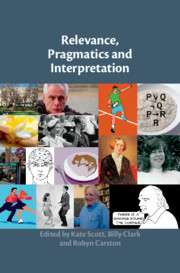Book contents
- Relevance, Pragmatics and Interpretation
- Relevance, Pragmatics and InterpretationEssays in Honour of Deirdre Wilson
- Copyright page
- Contents
- Contributors
- Cover Acknowledgements
- Introduction
- Reflections on the Development of Relevance Theory
- Part I Relevance Theory and Cognitive Communicative Issues
- 1 Scientific Tractability and Relevance Theory
- 2 Language Processing, Relevance and Questions
- 3 Quasi-Factives and Cognitive Efficiency
- 4 Evidential Explicatures and Mismatch Resolution
- 5 Representation and Metarepresentation in Negation
- 6 Pronouns in Free Indirect Discourse
- 7 The Development of Pragmatic Abilities
- Part II Pragmatics and Linguistic Issues
- Part III Figurative Language and Layered Interpretations
- References
- Author Index
- Subject Index
5 - Representation and Metarepresentation in Negation
from Part I - Relevance Theory and Cognitive Communicative Issues
Published online by Cambridge University Press: 08 July 2019
- Relevance, Pragmatics and Interpretation
- Relevance, Pragmatics and InterpretationEssays in Honour of Deirdre Wilson
- Copyright page
- Contents
- Contributors
- Cover Acknowledgements
- Introduction
- Reflections on the Development of Relevance Theory
- Part I Relevance Theory and Cognitive Communicative Issues
- 1 Scientific Tractability and Relevance Theory
- 2 Language Processing, Relevance and Questions
- 3 Quasi-Factives and Cognitive Efficiency
- 4 Evidential Explicatures and Mismatch Resolution
- 5 Representation and Metarepresentation in Negation
- 6 Pronouns in Free Indirect Discourse
- 7 The Development of Pragmatic Abilities
- Part II Pragmatics and Linguistic Issues
- Part III Figurative Language and Layered Interpretations
- References
- Author Index
- Subject Index
Summary
In this chapter, Jacques Moeschler addresses some complex issues about the function of negation and its interaction with metarepresentation.He identifies three distinct uses of negation, namely, descriptive negation and two kinds of metarepresentational negation (one metalinguistic, the other presupposition-cancelling), which differ in their semantic entailments. His key claim is that all three of them have what he calls ‘representational’ (or propositional) effects on the context, specifically the elimination and/or the strengthening of existing assumptions, albeit different for each of the uses.
Keywords
- Type
- Chapter
- Information
- Relevance, Pragmatics and Interpretation , pp. 80 - 92Publisher: Cambridge University PressPrint publication year: 2019
- 4
- Cited by

